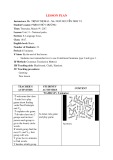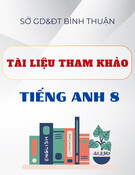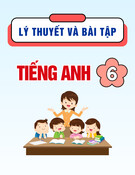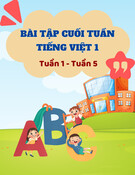LESSON PLAN
Ị Ễ Ư
Ị Ạ ƯƠ NG.
Instructors: Ms. TR NH TH MAI – Ms. NGÔ NGUY N NH VI. Student’s name: PH M THÙY D Time: Thursday, March 9th, 2017. Lesson: Unit 11 – National parks. Section: E. Language focus. Class: 10A7. English level: Basic. Number of Students: 33. Period: 45 minutes. I/ Aims: By the end of the lesson:
Students must remember how to use Conditional Sentence type 2 and type 3.
II/ Method: GrammarTranslation Method. III/ Teaching aids: Blackboard, Chalk, Handout. IV/ Teaching procedure:
Greeting New lesson
CONTENT TEACHER’S ACTIVITIES
STUDENTS’ ACTIVITIES WAMR UP ( 5 minutes)
Ss listen rule game and play game.
Answers:
T welcomes the class. T asks Ss to play game about finding verbs Past Participle and Ved . T explains rule game. T divides class into 2 groups and invites 1 person each group to go to the board, circle words. If which group find the most V3 and Ved, that group will win. T gives Ss two minutes to find words. T decides which group
Ss listen.
to win. T gives gift. T introduce lesson: Review Conditional sentence type 2 and type 3. T writes the topic on the board and asks Ss to take note. Unit 11 (cont) Review Conditional sentence type 2 and type 3.
Ss take note.
TEACHING (40 minutes) PRESENTATION (5 minutes) _ Ss look at the board.
_ T writes one example on the board. “1.They don’t understand the problem. They won’t find the solution.”
_Ss notice carefully.
_ Ss take notes.
Complete each of the following Conditional sentence 2 so that it means. E.g.: 1.They don’t understand the problem. They won’t find the solution. (+)If they understood the problem, they would find the solution. () If they did not understand the problem, they would not find the solution. They would find the solution if they understood the problem. (?) Would they find the solution if they understood the problem?
_ Then T explains how to do it. “(+)If they understood the problem, they would find the solution. () If they did not understand the problem, they would not find the solution. They would find the solution if they understood the problem. (?) Would they find the solution if they understood the problem?”
_ Ss look at the board and take note.
Structures: (+) If +S + V2/ed+ …, S + would/ could + V1+… . ()If +S + didn’t + V1+…, S + would/ could not + V1+… (?) Would/Could + S + V1 + … if S + V2/ed + …?
_ T shows structures of Conditional sentence type 2 and asks Ss to take note. Structures: (+) If +S + V2/ed+ …, S + would/ could + V1+ … . ()If +S + didn’t + V1+ …, S + would/ could not + V1+… (?) Would/Could + S + V1 + … if S + V2/ed + …?
PRACTICE (5 minutes)
_ 3 students go to the board and write their answers. _Ss work individually.
2. I haven’t enough money, so I can’t buy a car. (+) If I had enough money, I could buy a car. () If I had not enough money, I could not buy a car. (?) Could I buy a car if I had enough money?
_Ss check answers and repair their exercise.
_T shows exercise and invites 3 students to do exercise on the board. “2. I haven’t enough money, so I can’t buy a car. (+)……. ()……. (?)…….” _ T checks their answers.
PRODUCTION (7 minutes)
_ Ss do exercise.
_T asks Ss to do exercise of Conditional Sentences type 2. “Now, I have exercise for you about Conditional Sentences type 2. And you have 5 minutes to do this exercise.”
_T shows answers of the exercise.
_Ss check answers and repair their exercise.
1. She doesn’t know anyone there, so she doesn’t live in London. (+)If she knew someone there, she would live in London. () If she didn’t know anyone there, she would not live in London. (?) Would she live in London if she knew someone there? 2. Mary doesn’t have enough money. She can’t buy a new car. (+) If Mary had enough money, she could buy a new car. () If Mary had not enough money, she could not buy a new
_T asks Ss to take note their notebook. _ Ss take note.
car. (?) Could Mary buy a new car if she had enough money?
Presentation (5 minutes)
_ Ss look at the board.
_ T writes one example on the board. “1.I didn’t see Lan last night, so I didn’t give her a gift.”
_Ss notice carefully.
_ Ss take notes.
Complete each of the following Conditional sentence 3 so that it means. E.g.: 1. I didn’t see Lan last night, so I didn’t give her a gift. (+)If I had seen Lan last night, I would have given her a gift. () If I had not seen Lan last night, I would not have given her a gift. I would have given Lan a gift if I had seen her last night. (?) Would I have given her a gift if I had seen her last night?
_ Then T explains how to do it. “(+)If I had seen Lan last night, I would have given her a gift. () If I had not seen Lan last night, I would not have given her a gift. I would have given Lan a gift if I had seen her last night. (?) Would I have given her a gift if I had seen her last night?”
_ Ss look at the board and take note.
Structures: (+) If +S + had+V3/ed+ …, S + would/ could + have +V3/ed + … . ()If +S + hadn’t + V3/ed +…, S + would/ could not + have +V3/ed +… (?) Would/Could + S + have +V3/ed + … if S + had+V3/ed + …?
_ T shows structures of Conditional sentence type 3 and asks Ss to take note. Structures: (+) If +S + had+V3/ed+ …, S + would/ could + have +V3/ed + … . ()If +S + hadn’t + V3/ed +…, S + would/ could not + have +V3/ed +… (?) Would/Could + S + have +V3/ed + … if S + had+V3/ed + …?
PRACTICE (5 minutes)
_T shows exercise and invites 3 students to do _ 3 students go to the board and write their 2. I didn’t know of your arrival last Sunday morning, so I couldn’t
answers.
_ Ss work individually. _Ss check answers and repair their exercise.
exercise. “2. I didn’t know of your arrival last Sunday morning, so I couldn’t meet you. (+)……. ()……. (?)…….” _T checks their answers. meet you. (+) If I had known of your arrival last Sunday morning, I could have met you. () If I had not known of your arrival last Sunday morning, I could not have met you. (?) Could I have met you if I had not known of your arrival last Sunday morning?
PRODUCTION (13 minutes)
_ Ss do exercise.
_T asks Ss to do exercise of Conditional Sentences type 3. “Now, I have exercise for you about Conditional Sentences type 3. And you have 5 minutes to do this exercise.”
_T shows answers of the exercise.
_Ss check answers and repair their exercise.
_T asks Ss to take notes their notebook. _ Ss take notes.
_Ss listen rule game and play game.
1.He didn’t buy a ticket yesterday, he couldn’t go the cinema. (+) If he (buy) had bought a ticket yesterday, he could have gone into the cinema. () If he had not bought a ticket yesterday, he could not have gone into the cinema. (?) Could he have gone into the cinema if he had not bought a ticket yesterday? 2. He didn’t study hard last night, so he didn’t pass his exam. (+) If he had studied hard last night, he would have pass his exam. () If he had not studied hard last night, he would not have pass his exam. (?) Would he have pass his exam if he had not studied hard last night? Tall – Short Fat – Thin Beautiful – Ugly Hot – Cold Exercise 1, 2, 3 on page 119,120.
_Ss do homework and prepare Unit 12 – A. Reading.
_T asks Ss to play game about adjective and explains rule game. _T asks Ss to do exercise 1, 2, 3 on page 119,120 and prepare Unit 12 – A. Reading.

















